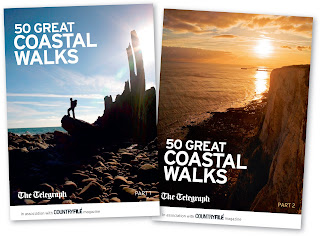“This is the BBC News at 6 – 5 men have been arrested and
charged with incitement and riotous assembly following a unauthorised mass
trespass and a scuffle with gamekeepers on private land on the hill Kinder
Scout in the Peak District”
It seems utterly astonishing today to think anyone would be
arrested and spend time in jail for simply walking on a piece of land which
they used to be able to walk on – and then couldn't. But this was the position in 1932 – whole areas
of land which previously were available to walk on had been commandeered and
given to a small selection of chosen lords, dukes and barons. These privileged people defended their new-found land vigorously – and even before the events on the 24th
April 1932, there had been several incidents of trespassing and violent scenes
on the now private lands.
It was made worse with the realisation about the Peak
District – being composed at it is of moorland and mountains – is completely
unsuitable for farming.
Kinder Scout
itself was used by the local landlords as an area for shooting game birds – and
as such was only
used around 12 days a year.
So, if the rest of the time the mountain was empty and deserted, why
weren’t walkers allowed to walk on it?
Perhaps if the
landowners opened a public path through Kinder Scout,
walkers could access the area without problems. But this seemed to be too much to ask.
By the 1920s, tens of thousands of people – mainly in the
North and mainly working class – went walking every Sunday. It was their way to escape the regimented
routine of their working lives – working often long hours between Monday and
Saturday. It was also a way of escaping
the smog-infested cities of the industrial North of England – like Manchester,
Salford, Sheffield, Huddersfield and Halifax.
By 1932, it was estimated that 15,000 working class walkers left
Manchester every Sunday. What made the
whole situation worse was that less than 1% of the Peak District enjoyed public
access – and there were only 12 permitted paths to walk on.
This wasn’t a situation certain groups in the working class
were prepared to accept, and so the politics of the trespass became
socialist. The mass trespass was
organised by a group called the British Workers' Sports Federation (BWSF) – a
campaigning group set up in 1928 and largely made up of members and supporters
of the Communist Party. It had
campaigned for new Sunday football leagues and new football pitches before
taken on the might of the landowners.
The BWSF held camps at Rowarth in the Peak District, and
during the Easter 1932 camp, a group of ramblers – of which the now legendary
Benny Rothman was one – went for a walk on
Bleaklow and were set upon by
gamekeepers. "It was not at all
unusual for ramblers to get very, very badly beaten by them," Rothman stated
in an interview later, "and of course if you were working-class there was
no redress."
Hence were sawn the seeds of the mass trespass on Kinder
Scout.
On the day many more people turned up than was envisaged –
some reports say 400, others nearer 500 – but it was a truly significant
number. Joining them, however, was a
sizable number of police. Rothman became
the unintentional speaker of the congregation’s meeting point at a quarry in
Hayfield. He spoke about the need to attack
the laws of trespass, and after warning the mass against using violence towards
the keepers, he led the crowd up Kinder Scout.
In the ensuing battle with the gamekeepers, one keeper
sprained his ankle and the ramblers carried on with the gamekeepers
fleeing. On Snake Path, the walkers met
another group coming over from Sheffield.
The two groups chatted, heard speeches and then parted. When the Manchester ramblers returned to
Hayfield, they found the injured keeper had informed the police – and six
ramblers, including Rothman, were sent for trial.
At Derby Assizes – some 60 miles from the ramblers’ homes – the
ramblers were put on trial. Of the six accused,
two were cotton piece workers,
two engineers, one was unemployed and one a student. The jury of their peers destined to pass
judgment comprised of
two brigadier generals, three colonels, two majors and
three captains - altogether 11 members of the landowning class. The social contrasts couldn’t have been any
greater.
Five of the six were found guilty and were jailed for
between two and six months. Rothman’s
term was four months in Leicester jail.
The arrest and subsequent imprisonment of the trespassers
unleashed a huge wave of public sympathy, and ironically united the ramblers
cause.
A few weeks later in 1932, 10,000 ramblers – the largest
number in history – assembled for an access rally in the Winnats Pass, near
Castleton, and the pressure for greater access continued to grow.
In immediate terms, the Mass Trespass of 1932 represented a
defeat for the Manchester ramblers. But it turned out to be a catalyst for
change: Publicity about the affair led to the formation in 1935 of the
Ramblers' Association; the 1949 National Parks and Countryside Act gained
access to the moors of Kinder Scout and the Peak District and even further down
the line, the trespass led to the modern day Countryside and Rights of Way Act
in 2000 for England & Wales and the Land Reform Act 2003 in Scotland.
The mass trespass is rightly celebrated and commemorated as
possibly the single most important act for walkers in this country – and long
may we celebrate and remember it.




















